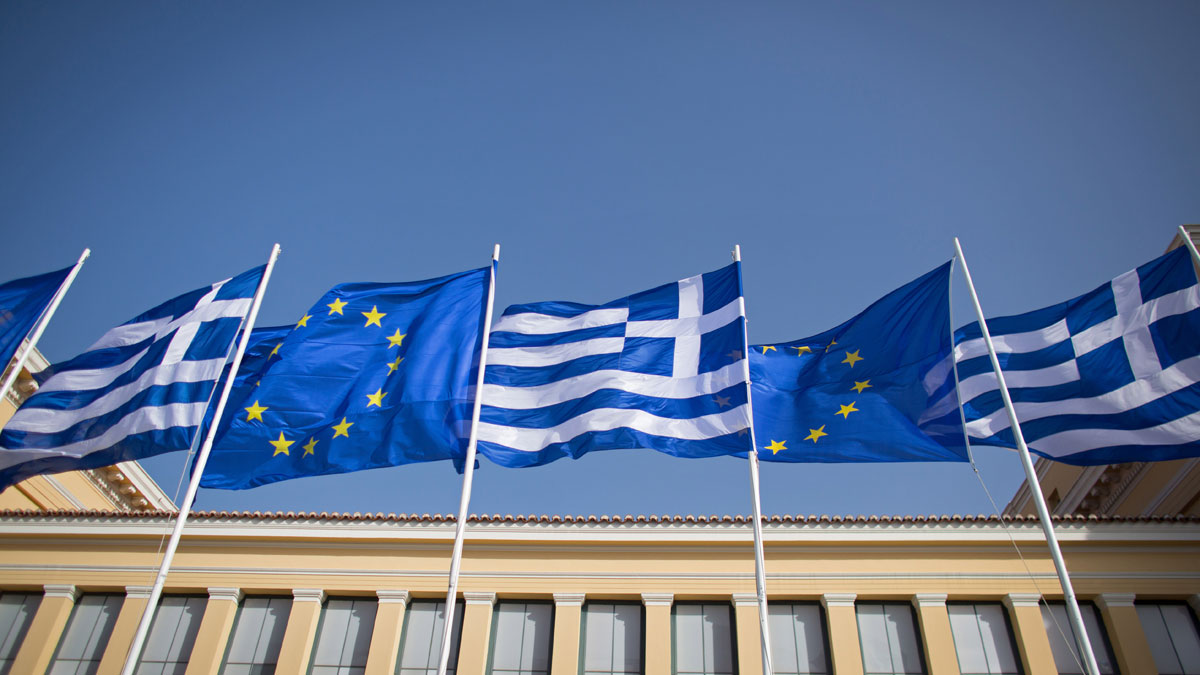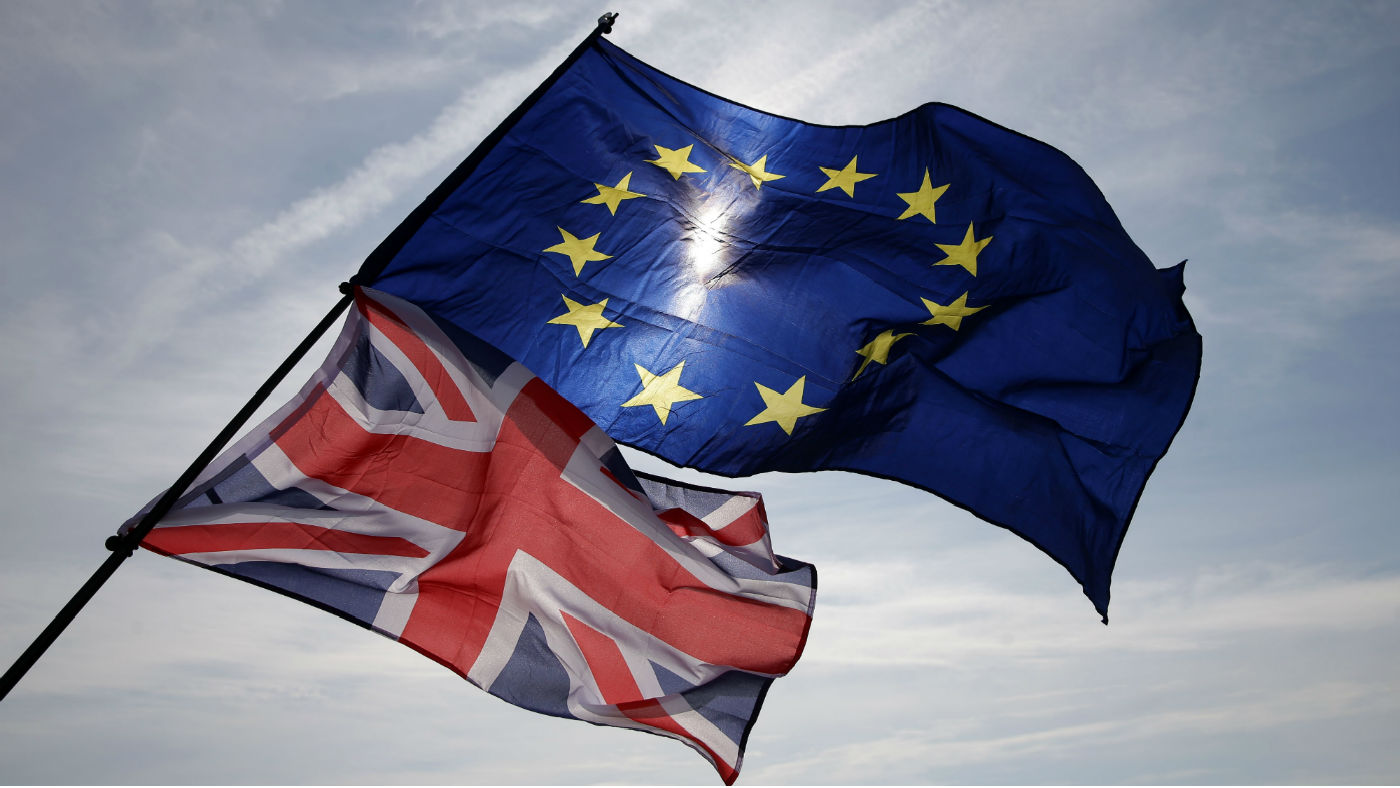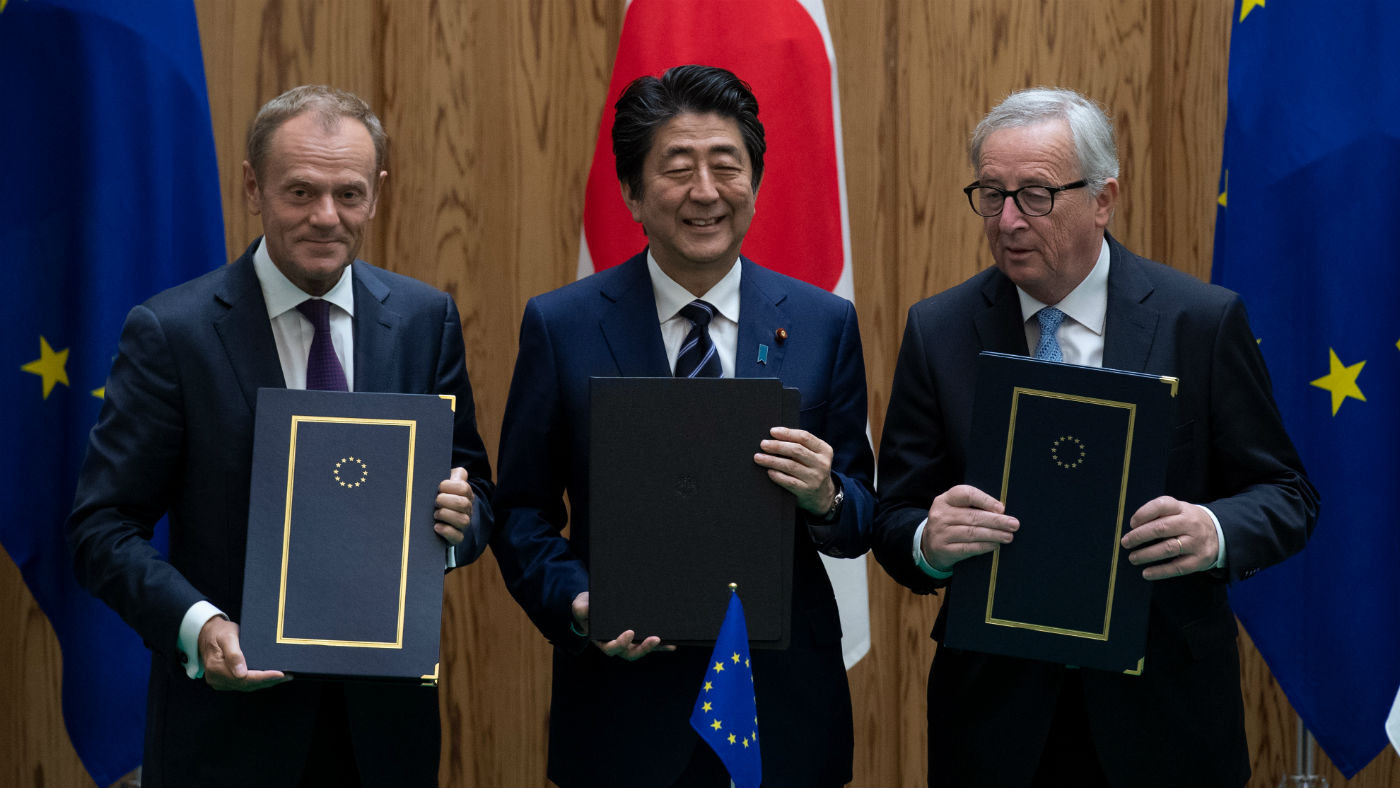Greece crisis: has bailout ended threat of Grexit?
Economic targets remain ambitious and the political situation is far from settled

A free daily email with the biggest news stories of the day – and the best features from TheWeek.com
You are now subscribed
Your newsletter sign-up was successful
Greece finally has a new bailout deal and, according to The Times, investors are already moving on – they're now more concerned about the situation in China, it says, than an impending implosion of the eurozone.
But some prominent analysts suggest that the post-bailout respite is merely a calm in the eye of the storm, and that a 'Grexit' – a Greek exit from the euro – is a very likely scenario once an overly-ambitious deal falls apart.
So what will the new bailout mean, and can it really save the heavily indebted country?
The Week
Escape your echo chamber. Get the facts behind the news, plus analysis from multiple perspectives.

Sign up for The Week's Free Newsletters
From our morning news briefing to a weekly Good News Newsletter, get the best of The Week delivered directly to your inbox.
From our morning news briefing to a weekly Good News Newsletter, get the best of The Week delivered directly to your inbox.
Has the deal been completely sealed now?
Yes. The European Stability Mechanism approved the first tranche, worth €26bn, of the €86bn package this morning, The Guardian reports, and has sent over an initial €13bn "immediately" to pay key bills, including the €3.2bn repayment due to the European Central Bank today. Another €10bn to recapitalise banks will also be sent imminently, and €3bn will follow before the autumn.
What happens then?
That's when things get interesting. In October the new deal has its first review and the International Monetary Fund, which has taken part in negotiations but not yet committed to providing funds, will decide whether it's in or out. If all goes well, there should be some discussion of the debt relief the IMF believes is necessary and a timetable for future payments under the package will be agreed.
A free daily email with the biggest news stories of the day – and the best features from TheWeek.com
Are there any potential hiccups?
Plenty. Greece might fail to meet creditors' expectations on the pace of its reform programme, especially in light of fresh political instability after prime minister Alexis Tsipras resigned and called for fresh elections. If opposition parties fail to form a stable government the country will go to the polls for the sixth time in eight years and the outcome is far from certain, not least because hard left rebels from within Tsipras's Syriza ranks could split and campaign as a separate party.
The IMF, whose assumed involvement was critical in securing German parliamentary support, may also decide that concessions on Greek debt are not sufficient, and think-tank Capital Economics has described as "far too optimistic" fiscal targets included within the bailout. The three-year deal contains a target for a budget deficit this year of just 0.5 per cent and surpluses escalating to 3.5 per cent by 2017.
What would happen if the terms of the deal were broken?
Debt relief might not be offered, meaning repayments on a debt pile which is due to peak at more than 200 per cent of GDP next year would continue to weigh heavy. If the IMF decides not to be involved, that could precipitate eurozone countries pulling their support, which may also happen if Greece doesn't meet stringent demands for extensive reforms. All in all, Capital Economics remains convinced that Greece will be forced out of the euro within a year.
Do others agree?
Many do, but there are optimists as well. Debt repayment terms are already less punishing and many of the laws relating to the reforms have been passed in Greece, so some suggest that the country should be able to survive early tests. After that, reforms should, in theory, revitalise the economy and, coupled with debt relief, put it back on a path to sustainable growth.
And what about the situation for Greeks?
Capital controls are being lifted, so the Greek people are at least able to access their own money, but cuts demanded in return for the bailout, such as the removal of pension top-ups an end to early retirement and certain VAT exemptions, will have an impact. The Daily Telegraph says Athens is already the only city in Europe to have dropped out of the top tier of an annual 'liveability' index.
In the longer term, ordinary Greeks may well hold the key to the success of the deal. Currently, a majority support the bailout despite its onerous conditions, and if growth returns they'll continue to do so, but if more people begin to suffer and unrest grows it will be difficult for the government to press on with the creditors' reform agenda.
Greece crisis: has the threat of Grexit gone for good?
23 July
Last night Greek parliamentarians backed a second legislative package that will usher in the reforms demanded in return for talks on an €86bn third bailout deal.
The vote passed easily, and bridging loans already provided have staved off the risk that Greece will default on repayments to the European Central bank. So why are some still talking about a Grexit?
What was the significance of last night's vote?
Greece's creditors demanded a second package of reforms in return for entering talks on a third bailout deal. The first package was passed last week, which included changes to the pension system and increases to VAT rates. Last night's vote was less controversial, with proposals including a range of what the BBC describes as 'structural' measures, including the implementation of EU-wide rules to shift the burden of bank bailouts onto private sector creditors and to protect deposits.
Was it a close vote?
No. Given the support of opposition parties who believe that a deal to remain in the eurozone must be agreed at all costs, it would have been a huge surprise if it hadn't passed - and in fact it sailed through by 230 votes to 63. The bigger question was how many MPs would rebel on the coalition government's benches.
After a revolt by 32 of his own Syriza MPs during the last vote, and a number of abstentions, Alexis Tsipras secured only 121 votes in favour from his own side. Reuters notes that under Greek law a government needs a minimum of 120 MPs to support it to win a confidence motion, meaning that a larger mutiny this time would have dealt a heavy symbolic blow. In the event there were three fewer rebels, with even hardline former finance minister Yanis Varoufakis voting in favour.
The Government is out of the woods in the short term, but with it now being reliant on opposition votes and party sources acknowledging a deep split in Syriza, the Financial Times says it is likely that new elections will be called, probably after bailout negotiations have concluded.
So does that mean that the bailout deal is now done?
Far from it. The BBC notes that Tsipras attempted to head off a rebellion by postponing two contentious reforms – those removing VAT leniency for farmers and phasing out early retirement, which will not come before parliament until August. The FT reports that creditors want to have discussions about a third bailout package completed by 7 August, and Greece has repeatedly been told that it must implement reforms first before negotiations can even begin.
After the last deal was struck, what's left to discuss?
Plenty. While the bailout offer of €86bn has been discussed, the actual terms on which it is offered still need to be agreed, and with relations now horribly soured on all sides this is unlikely to be easy. There is also the matter of debt relief, which Greece will undoubtedly demand and which, in a surprise intervention, the IMF has said is essential if a new bailout is to be successful. The IMF's recent hint that it might not contribute to the new bailout if there is no movement on the issue puts pressure on the likes of Germany to soften its stance.
Isn't Greece in arrears with the IMF?
Not since this week, when €7bn of bridging loans from emergency European funds were raided to repay these obligations and meet repayments due to the European Central Bank.
And what about the capital controls?
They are still in place and Greek banks remain on life support. Doors were opened this week to allow access to deposit boxes and for people to take out a larger one-off sum of €420, but this is simply a week's worth of €60 daily limits in one go. Orders preventing money being moved overseas remain in place.
Greek banks are still dreadfully short of money and while insiders reckon €1.8bn in additional credit has been extended by the ECB in the last week, including a further €900m yesterday, the sector needs a more thorough recapitalisation. That won't happen until a final deal is done.
But at least Grexit has been avoided
Yes, for now. But in truth Greek debt, currently more than 180 per cent of GDP and rising, remains unsustainable in the estimation of many, and this deal risks merely kicking the can down the road again. Others criticise draconian reforms demanded by creditors which could hit economic growth.
The FT's Wolfgang Munchau says a deal is likely to include "less debt relief than needed, and more austerity than Greece can bear", adding that if economic growth is undermined then an accord might simply fail, or Greeks may finally decide they have had enough. He says Grexit "remains the most likely outcome".
Optimists would counter that if Greece can normalise its relationships, enforce reforms and go at least some way to liberalising the economy, then it may begin to earn its way back from the brink. This could allow for a meaningful recovery to take hold before any further action needs to be taken.
Grexit: has the Greek referendum resolved anything?
6 July
The Greek people have resoundingly rejected the terms of a bailout offered by the EU, the IMF and the European Central Bank, voting 61-39 against it. The margin of the No victory was larger than expected, and offered an unusual point of clarity in the Greek crisis.
What happens next is less clear-cut. A Greek exit from the euro – or Grexit – is more likely, but not inevitable. The more immediate problem may be a shortage of cash in Greek banks, which have been closed for a week. International transfers of money, and withdrawals of more than €60, have been banned.
Q&A: The Greek referendum
Why did Greece call a referendum?
The Greek government had said that while it could not accept a deal that amounted to "blackmail", nor did it have the mandate to reject a deal without going to the people. The referendum, called just before "last ditch" talks on a revised agreement were due to begin last week, effectively ended negotiations, leading to the Greek default days later, reports the Financial Times.
There is some disagreement on the motives of the Greek prime minister, Alexis Tsipras. Some believe that it was a negotiating tool designed to prompt an improved offer from creditors – but if it was it failed. Others, including Greek newspaper Kathimerini, suggest the vote was called because Tsipras would not have been able to get a deal through the Greek parliament.
What happens now?
More talks. The Greek government has been arguing that a No vote would give it a stronger hand in negotiations with Greece's creditors, and the resignation of the finance minister, Yanis Varoufakis, this morning may be intended as a signal that the country is serious about reaching a deal. Varoufakis was unpopular with many senior figures at the IMF and ECB.
Angela Merkel and Francois Hollande will meet today to discuss their next moves. The French president is likely to argue that new bailout terms should be offered to Greece, the Financial Times reports, but few others in the eurozone are confident that a deal is achievable or desirable.
This afternoon the ECB's governing council will meet to discuss whether to maintain emergency funding to Greek banks, and if so for how long. The Daily Telegraph said on Friday that Greek banks were down to their last €500m in cash reserves. If the ECB's flow of euros were withdrawn, Greek banks would have to start printing their own currency, and the messy process of exiting the single currency would begin.
How close is Greece to default?
In one sense Greece already has defaulted and in another it has two weeks before the term comes into play. According to Bloomberg and others, ratings agencies and the like do not consider last week's missed payments to the IMF a default – it is merely 'in arrears'. The bigger concern is the €3.5bn due to the European Central Bank on 20 July, as failure to make that would almost certainly bring an end to the ECB's emergency liquidity, assuming that it had lasted that long.
How much is at stake?
Greece is the most indebted country in the eurozone, with national debt representing 180 per cent of its entire national output. In absolute terms the numbers are small relative to the UK. Greece's debt of €320bn is significantly lower than the UK's, which is now above £1,500bn, but Greece is a much smaller economy with less ability to earn its way out of trouble.
The payment due in arrears to the IMF is around €1.6bn and the amount Greece didn't get from its last bailout after talks collapsed is €7.2bn. Greece owes its creditors more than €242bn, according to Reuters. The Wall Street Journal says the IMF accepts that a fresh deal would need to include debt relief and new funding of €60m.
That sounds similar to the Greek demands. What's the problem?
Greece has indeed repeatedly called for debt relief – in fact some claim that it was willing to abandon the referendum in return for a write-off during deadline-day discussions earlier this week. But both sides had drawn lines they would not cross and eventually trust broke down.
The final offer to Greece demanded that it raise VAT, accelerate pension reforms, bring forward a staged increase in state pension age to 67 and phase out a top-up for poorer pensioners earlier than planned. The Greeks said they would not reduce pension payments or increase the rate of VAT.
Nevertheless, the two sides are only a few hundred million euros apart – a small figure set against the sums involved.
What is the situation in Greece?
In short: bad. Successive deals have only kicked the problem of an unmanageable debt-load down the road and the reforms agreed in return for bailout funds, including higher taxes for working age citizens, have had severe implications for the economy. Unemployment in Greece remains above 25 per cent and youth unemployment is close to 60 per cent.
Under the capital controls that have been in place all of this week, most citizens can only take €60 in cash, and pensioners have been able to get only half their weekly payments.
How did Greece get into the situation in the first place?
Like many countries and especially those in southern Europe, Greece's economy was very unbalanced in the years leading up to the financial crisis. Spending significantly outstripped tax revenues, leaving it exposed with the economy tanked.
And tank it did, by around 9 per cent in 2011 alone. In fact, Greek GDP has fallen by around a quarter since the crisis began and it fell back into a fresh recession – defined as two or more quarters of negative growth – in the first quarter when economic output fell by 0.2 per cent.
One issue was pensions, which were more generous than most other European countries. Many people were able to take early retirement before the age of 60 and the amounts involved were high relative to average salaries. The country also has a poor record on tax collection from its rich. Estimates for tax avoidance range from 10 per cent to 40 per cent of the expected tax-take.
Why have things come to a head now?
They've come to a head a few times, but the main difference this time is who is in government. After a political crisis following the failure to elect a president last year and amid ongoing civil unrest at the ongoing economic crisis and its effects, Greece elected the left-wing anti-austerity Syriza party, led by Alexis Tsipras. The new government, which fell just short of a majority but enjoys strong approval ratings, has promised to unpick the deal with creditors. He was, though, elected on a pledge that included remaining in the euro – and European leaders have consistently stated they want Greece to stay.
What would Grexit mean for Greece?
The consequences are much disputed. Experts have predicted everything from a state failure and subsequent totalitarian takeover to the end of the euro in months. The New York Times cites the relatively benign situation in Argentina after its 2001 and 2006 defaults, although it acknowledges the situation is very different in import-dependent Greece.
There are two schools of thought. One holds that the euro prevents strategic currency devaluation, and that the Grexit option is therefore preferable, at least in the long run. The other suggests that hyper-devaluation would follow a return to the drachma, sending the country into an inflationary economic spiral.
What would it mean for the rest of Europe?
The likelihood of contagion at state level has become more remote since the past few bailouts, and the relative strengthening of other crisis-hit economies. Even so, markets across Europe and beyond would probably go into a tailspin, and the Telegraph has warned that savers may face a 10 per cent hit on pensions and Isas.
The more significant consequences are political. The euro was meant to be irrevocable and irreversible, so letting Greece fall out of the currency would be embarrassing to say the least. If Greece struggles after a traumatic exit from the currency, it could be the cautionary tale that catalyses reforms towards greater integration.
How would a Grexit affect the UK and our own referendum?
There is no direct link, but we can expect anti-EU campaigners to present the current crisis and its consequences as the result of excessive or misguided EU bureaucracy. Number 10, however, suggests that eurozone weakness will strengthen David Cameron's negotiating hand ahead of the vote in Britain.
-
 Democrats push for ICE accountability
Democrats push for ICE accountabilityFeature U.S. citizens shot and violently detained by immigration agents testify at Capitol Hill hearing
-
 The price of sporting glory
The price of sporting gloryFeature The Milan-Cortina Winter Olympics kicked off this week. Will Italy regret playing host?
-
 Fulton County: A dress rehearsal for election theft?
Fulton County: A dress rehearsal for election theft?Feature Director of National Intelligence Tulsi Gabbard is Trump's de facto ‘voter fraud’ czar
-
 Is Trump's tariffs plan working?
Is Trump's tariffs plan working?Today's Big Question Trump has touted 'victories', but inflation is the 'elephant in the room'
-
 Is Brexit to blame for the current financial crisis?
Is Brexit to blame for the current financial crisis?Talking Point Some economists say leaving the EU is behind Britain’s worsening finances but others question the data
-
 Deal or no deal: showdown Brexit talks resuming in Brussels
Deal or no deal: showdown Brexit talks resuming in BrusselsIn Depth CBI says trade agreement ‘can and must’ be reached - but Irish Taoiseach is not optimistic
-
 Why Europe may face an oil shortage within a decade
Why Europe may face an oil shortage within a decadeSpeed Read New analysis suggests supply set to fall at faster rate than shift to greener alternatives
-
 Are British tourists boycotting the EU?
Are British tourists boycotting the EU?In Depth Thomas Cook says more Brits are looking outside the EU for their summer holiday
-
 How will Brexit affect immigration?
How will Brexit affect immigration?In Depth Business leaders urge Government to scrap ‘blunt migration targets’ amid fears of labour shortfall
-
 EU and Japan sign free trade deal
EU and Japan sign free trade dealSpeed Read Both sides hope wide-ranging agreement will act as counterweight to Trump’s protectionist forces
-
 EU budget: more money for ever-closer union
EU budget: more money for ever-closer unionIn Depth The EU seeks to fill its post-Brexit funding shortfall with a new seven-year budget